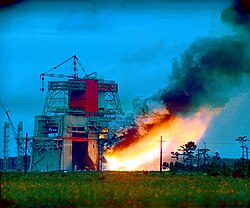Mississippi Test Facility
 |
|
 The B-1/B-2 Test Stand holding space shuttle components (1987) |
|
| Agency overview | |
|---|---|
| Formed | 1961 |
| Preceding agencies |
|
| Jurisdiction | U.S. federal government |
| Headquarters | Hancock County, Mississippi |
| Agency executive |
|
| Parent agency | NASA |
| Website | Stennis Space Center home page |
|
Rocket Propulsion Test Complex
|
|

Static Test Firing S-1C Saturn V Mississippi Test Facility MTF
|
|
| Location | Bay St. Louis, Mississippi |
|---|---|
| Built | 1965 |
| Architect | NASA |
| NRHP reference # | 85002805 |
| Significant dates | |
| Added to NRHP | October 3, 1985 |
| Designated NHL | October 3, 1985 |
The John C. Stennis Space Center (SSC) is a NASA rocket testing facility. It is located in Hancock County, Mississippi (United States), on the banks of the Pearl River at the Mississippi–Louisiana border. As of 2012[update], it is NASA's largest rocket engine test facility. There are over 30 local, state, national, international, private, and public companies and agencies using SSC for their rocket testing facilities.
The initial requirements for NASA's proposed rocket testing facility required the site to be located between the rockets' manufacturing facility at Michoud Assembly Facility in eastern New Orleans, Louisiana, and the launch facility at the Kennedy Space Center in Florida. Also, the site required barge access as the rocket motors to be tested for Apollo were too large for overland transport. Additionally, the Apollo motors were too loud to be tested at Marshall Space Flight Center's existing test stands near Huntsville, Alabama. A more isolated site was needed.
After an exhaustive site selection process that included reviews of other coastal locations including Eglin Air Force Base in Florida plus islands in both the Caribbean and the Pacific, NASA announced formation of the Mississippi Test Facility (now known as Stennis Space Center) on Oct. 25, 1961, for testing engines for the Apollo Program. A high-terrace area bordering the East Pearl River in Hancock County, Miss., was selected for its location. NASA entrusted the U.S. Army Corps of Engineers with the difficult task to procure each land parcel either by directly purchasing the land or through acquisition of a perpetual easement.
...
Wikipedia


